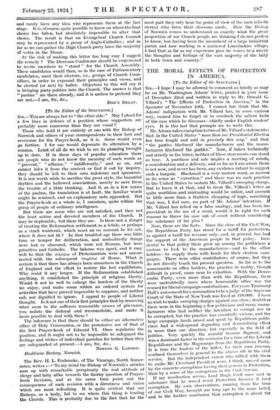[To the Editor of the SPECTATOR.]
Sin,—You are always fair to "the other side." May I plead for a few lines in defence of a position whose supporters are probably more numerous than they are vocal ?
Those who hold it are entirely at one with the Bishop of
Norwich and others of your correspondents in their love and reverence for the Prayer-book, as it is. Some would even go further. I for one would deprecate its alteration by a comma. Least of all do we wish to see its phrasing brought up to date. If in these days of popular education there are people who do not know the meaning of such words as " prevent," " affiance," " indifferently," and so on, and cannot infer it from the context or find it out by inquiry, they should be left to their own indolence and ignorance. It is not worth while to sacrifice the great style, the beautiful rhythm and the hallowed associations, merely to save them the trouble of a little thinking. And if, as in a few verses of the psalms, the translation is at fault, the familiar words might be retained, and an explanatory note appended. But the Prayer-book as a whole is, I maintain, quite within the grasp of people of ordinary intelligence.
- But there are some who are not satisfied, and they not
the least active and devoted members of the Church. It may be deplorable, but there they are. Is there not a danger of treating the Reformation settlement as a fetish, or perhaps as a strait waistcoat, which must on no account be let out, where it does not fit ? In that troubled age there was little time or temper for deliberation, and undoubtedly things were lost or obscured, which were not Roman, but were primitive and Catholic. The balance was upset, and it may well be that the AXeisfren of Protestantism were not uncon- nected with the subsequent enreppoXat of Rome. What is certain is that there has always been uneasiness in the Church of England and the effort to restore the lost equilibrium. Why resist it any longer. If the Reformation established anything, it established the principle of religious liberty. Would it not be well to enlarge the borders of the liberty we enjoy, and make room within an ordered system for activities that have proved impossible to suppress, and neither safe nor dignified to ignore. I appeal to people of Liberal thought. Is it not one of their first principles that by removing what seem to the sufferers reasonable causes of grievance, you isolate the disloyal and irreconcilable, and make it more possible to deal with them ?
The inference is that there should be either an alternative
office of Holy Communion, or the permissive use of that of the first Prayer-book of Edward VI. Once regularize the position, and it ought not to be impossible to safeguard the feelings and wishes of individual parishes far better than they are safeguarded at present.—I am, Sir, tee., NORTON G. LAWSON.
Haddiscoe Rectory, Norwich.
The Rev. IL L. Fosbrooke, of The Vicarage, North Somer- cotes, writes :—" To my mind the Bishop of Norwich's articles sum up with remarkable perspicuity the real attitude of clergy and laity alike towards the thorny question of Prayer- book Revision, and at the same time point out the consequences of such revision with a directness and vision which are most refreshing. It is quite evident that our Bishops, as a body, fail to see where this thing is leading the Church. This is probably due to the fact that for the
most part they only hear the point of view of the men (chiefly clerics) who form their diocesan circle. How the Bishop of Norwich comes to understand so exactly what the great proportion of our Church people are thinking I do not profess to know, but having been the incumbent of a large industrial parish and now working in a scattered Lincolnshire village, I find that as far as my experience goes he voices to a nicety the thoughts and feelings of the vast majority of the laity in both town and country."










































 Previous page
Previous page